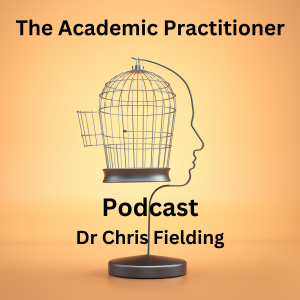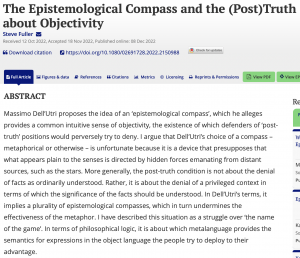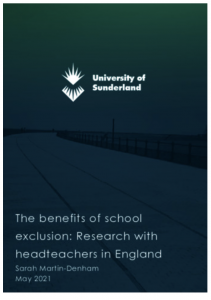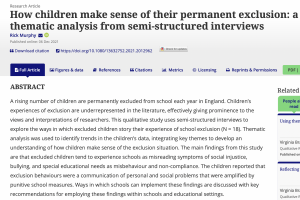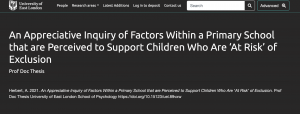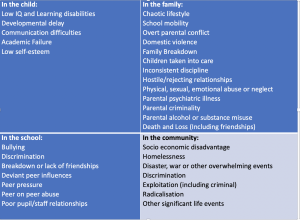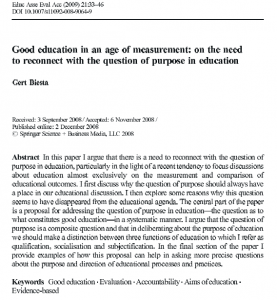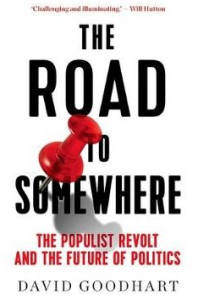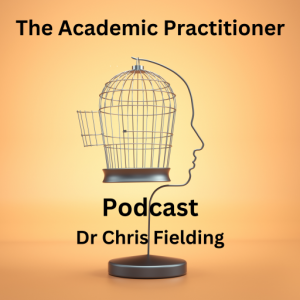I recently wrote a post looking at Steve Fuller’s ideas on post truth (Post Truth and the name of the game) and this first podcast takes some of ideas and relates them to our work as practitioners. I set a charter for the podcast to keep things on the straight and narrow. We will be keeping things jargon free, …
Category: Post
Dec 18
Post-truth and the rules of the game
This time, I am looking at an article by Steve Fuller which is part of an entertaining, ongoing academic argument he is having with Massimo Dell’Utri on post-truth, epistemology and the way we make sense of the world. Fuller has taken exception to Dell’Utri’s suggestion that we have an epistemological compass which provides a universal objectivity, …
Nov 27
Neurodevelopment and mental health screening of pupils following their second exclusion – Findings and Feasibility
This month, I am taking a closer look at this article from the Journal of Emotional and Behavioural Difficulties by Caron Lawson and colleagues. Caron Lawson, Kate Prentice, Janine Jennings & Kate Johnston (2022): First steps towards a mental health and neurodevelopmental screening of secondary school children following two fixed-term school exclusions in the UK, …
Nov 20
Removing the Blindfold -Survivors’ stories from the US troubled teen industry
This month, I am taking a closer look at Lesley Kopsick’s thesis ‘Removing the Blindfold: Survivors stories of academic and social-emotional learning within the troubled teen industry’ . In the course of her study, she interviews 10 ‘survivors’ about their experiences and her thesis begins with an extract taken from her own experience. I wound …
Aug 29
Using interoception to reduce dysregulated behaviour and school exclusion
This month, I took a closer look at an article by Emma Goodall and colleagues which claims that phsyiological body awareness (interoception) in some pupils (particularly autistic pupils and those with ADHD) is undeveloped and that teaching a simple programme to improve that awareness can reduce dysregulated behaviour in those pupils and the exclusion that …
Jul 10
Do headteachers see a benefit in the use of exclusion? – Sarah Martin-Denham 2021
This month I am taking a closer look at Sarah Martin-Denham’s 2021 policy brief for the University of Sunderland. It looks at the question of whether headteachers see any benefits to school exclusion. I am very much on the same page as the author, however, reading this brief had the unexpected effect of making me …
Jun 11
Permanent exclusion in the words of the child
The majority of the children enter our centre having either been permanently excluded from primary school or have been moved because they are very close to that point. The children sometimes tell us about their experiences of exclusion but in the academic literature, the voice of permanently excluded pupils is not often heard. Ricky Murphy …
Nov 21
Factors Within a Primary School that are Perceived to Support Children Who Are ‘At Risk’ of Exclusion. – An appreciative inquiry
After working in many roles at schools in central London, Amy Herbert, gained a lot of experience at working with children deemed ‘at risk of exclusion’. She then trained as an Educational Psychologist and felt that much of the research on exclusion was focussed on secondary pupils after the point of exclusion. She felt that …
Nov 12
My first week as the head of a Pupil Referral Unit – My world is upside down
It is my first week as the head of a primary aged pupil referral unit. Five children have just walked out of class and are wandering the corridor. None of the strategies that I employed as a mainstream headteacher are working and I am at a complete loss. I am a long way out of …
Oct 24
How anxious children attempt to cope in mainstream schools
This post takes a look at the 2020 doctoral thesis of Eleanor Ann Gray (University of Sheffield) and considers what implications it may have for improving inclusive practice for excluded pupils #inclusionfortheexcluded. Gray’s work attempts to develop an understanding of both the coping strategies used by anxious children in mainstream secondary schools and the conditions …
Feb 07
A parents’ perspective on exclusion – Parker et al. 2016
This post is my response to Parker et al.’s 2016 article about parental perspectives to their child’s exclusion published in the journal Emotional and Behavioural Difficulties. Their article discusses open ended interviews conducted (between Sept 2011 and July 2013) with the parents of 37 excluded children. Parents were asked about their child and school, why they thought …
Jan 30
Which children and young people are excluded from school? – Paget et al. 2018
This post is my response to the 2018 article by Amelia Paget and colleagues. Their work uses data from the Avon Longitudinal Study of Parents and Children (ALSPAC) discussed in an earlier post. ALSPAC recruited around fourteen and half thousand pregnant women in 1990/1991 and tracked their children through their school years and is continuing to track them in …
Jan 17
Mental Health and Behaviour in Schools – DFE 2018
This week, I was asked to speak on the subject of social emotional and mental health (SEMH) to a group of SENCOs and professionals working with young people in schools, As usual, I began by referring them to the DFE’s ‘Behaviour and Mental Health in Schools’. This post is a response to my re-reading of …
Jan 10
Child and adolescent mental health trajectories in relation to exclusion from school from the Avon Longitudinal Study of Parents and Children – Tejerina-Arreal et al.
This post is my response the 2020 open access article by Tejarina-Arreal et al. ‘Child and adolescent mental health trajectories in relation to exclusion from school from the Avon Longitudinal Study of Parents and Children‘ which appeared in the journal Child and Adolescent Mental Health. I argue that it is time to take the lessons of children excluded …
Jan 02
Children’s moral rights and UK school exclusions – Tillson & Oxley 2020
This post is a response to John Tillson and Laura Oxley’s (2020) article ‘Children’s moral rights and UK school exclusions’ which appeared in the journal Theory and Research in Education. I argue that an education system in which the only way that vulnerable children can access the support the need is through a damaging exclusion process cannot align with the …
Jan 01
Good education in an age of measurement – Gert Biesta
This is my response to Gert Biesta’s paper ‘Good Education in an age of measurement’. It was one of the first that I was introduced to on starting my doctoral studies at MMU and it stuck with me throughout. It opened up a new way of thinking. He describes the purpose of education as qualification, socialisation …
Jan 01
Giving the ‘nowheres’ a ‘somewhere’ – David Goodhart
This post is my response to David Goodhart’s book: The Road to Somewhere: The Populist Revolt and the Future of Politics. Goodhart’s contention is that we are split into two main groups. The ‘Anywheres’ are citizens of the world, accept globalisation as a force for good and make up about 25% of the UK. The ‘Somewheres’ …

